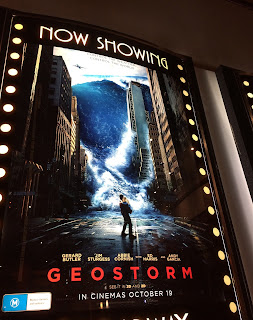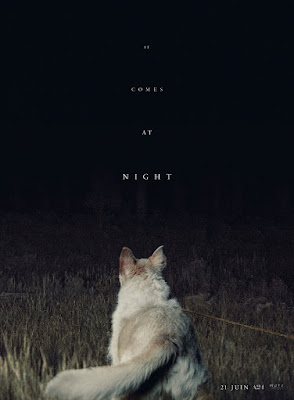Since it is October, here is the Midnight Ramble's reviews of the horror-related films at this year's New Zealand International Film Festival.
Tragedy Girls (dir. Tyler MacIntyre)
Two teenage girls, Sadie (Brianna Hildebrand) and McKayla (Alexandra Shipp), run a blog tracking the crimes of a local serial killer. Unimpressed with his lacklustre performance (and its effect on their website traffic), they take matters into their own hands to boost his (and their) numbers...
If I am going to watch a movie featuring horrific acts of violence against the human body, it better be lathered in a thick layer of irony.
An absolutely pitch black, dead-eyed comedy about two best friends dealing with the end of high school, college, dating and serial murder,
Tragedy Girls is the horror comedy for our social media-obsessed age.
For a movie like this to work is dependant on a couple of things. The first is tone - skew too real and you lose the humour, go too OTT and you will blunt its bite.
Tragedy Girls tackles its subject with no holds barred, juggling gore-soaked set pieces with the subtle nuances of two co-dependant teens attempting to find their way into adulthood.
The second element is casting. Hildebrand and Shipp are the beating, exposed heart of this story, and the movie gorges itself on their dynamite chemistry.
Hildebrand caught attention with her role in
Deadpool, but here she gets to deliver the kind of performance that will get her some bigger roles. She manages to make this sociopath sympathetic and weirdly likeable without sacrificing how utterly irredeemable she is. It helps that the script gives her a romantic subplot with a normie - it adds a (wafer-thin) layer of humanity while also making her creepier. You are never sure if she is just using him or genuinely interested.
Previously known as the actress who replaced Zendaya in the Aaliyah movie and the actress who replaced Halle Berry as Storm in
X-Men Apocalypse, Alexandra Shipp finally gets a role to call her own here. I would not be surprised if this movie gives her more name recognition. It helps that her role is showier than Hildebrand's - unlike Sadie and her romantic travails, McKayla's psychosis is completely pure, and Shipp gives the character a child-like gusto that is equal parts hilarious and terrifying. Gleefully amoral, Shipp is the Harley Quinn we never got. While the actresses are great as stone-cold killers, what gives the pair's performances - and the movie - warmth is the friendship between McKayla and Sadie. There is a genuine rapport between Hildebrand and Shipp that makes them a friendship to root for - and that includes the fact that they are stone cold killers AND self-obsessed narcissists.
Another thing I liked about this movie was how it did not try to make these characters heroes. What empathy we get is their bond, and the movie's focus on their friendship is enough to keep them relatable. It is a testament to how well this relationship is weaved through the movie that the movie works so well. Adding to this, the movie never veers away from how despicable their actions and motives are. The movie winds up being both intoxicating and sickening, but in the right proportions.
While I found the denouement incredibly disturbing, I feel like giving the filmmakers a hand for following their conceit to the end, without resorting to a conventional ending (there is not even a final girl to vanquish them).
Hilarious, caustic and completely nihilistic,
Tragedy Girls is one of my favourite movies of 2017.
It Comes At Night (dir. Trey Edward Shults)
An unknown contagion has swept the globe, reducing humanity to a few disparate families scrabbling for existence. Joel Edgerton plays a man determined to protect his family (Carmen Ejogo and Kelvin Harrison Jr.) at all costs. When another family (Christopher Abbott, Riley Keough and Griffin Robert Faulkner) arrives at their fortified home, he agrees to let them in. As the families try to get on with life, their tenuous bond is tested by the unseen terrors outside, as well as their own paranoia about each other.
A feature of zombie films is the breakdown of human relationships and interactions between the main characters.
It Comes At Night takes this dynamic and removes everything else - the 'sickness' the characters fear is never identified or explained; the infected are only shown once; and we never get an overview of how the outbreak has affected the rest of the world.
It Comes at Night boils down to a very primal fear: the loss of control. Edgerton runs his home under a strict form of martial law. Ultimately, he fails. What makes it worse is that he - and the viewer - never know why.

While I enjoyed this movie, and found it effective as a human horror story, I need to address a factor that is going to influence this review. Like most people who enjoy surprises and fun, I try to go into a movie blind. I almost got away with it for this one, but on the day I saw it I caught a podcast where a critic I like briefly offered a negative opinion on the movie. No spoilers were revealed, but the critic had problems with the choices a certain character made. It was over so quickly I did not have time to skip ahead. So now I had to go into the movie with this vague critical frame, and it drew attention to parts of the movie I would have probably have overlooked.
While I appreciate how oblique the movie is, there are certain parts of the ending where I felt confused enough to be - briefly - ejected from the movie. I ended up checking the plot summary after it was over so I could figure what happened. So while I did enjoy the movie, and I recommend it, this little tangent really threw off the whole experience.
I am a fan of genre movies that take out the tropes and still manage to function, and
It Comes at Night is a great example of this approach. For hard-core genre fans, this movie might come off a little pedestrian. The movie's tone and narrative are suitably nihilistic, but apart from its minimalist aesthetic the movie does not really push the envelope.
The acting from the cast is fantastic. Edgerton anchors the whole show as the taciturn patriarch. Introduced executing his infected father-in-law, he manages to feel both sympathetic and terrifying. With his basilisk stare and stillness, he is the perfect embodiment of the film's ambiguous point of view.
As his teenage son, Kelvin Harrison Jr. is horrifically relatable and alien at the same time. Clearly affected by what his family does to survive, he is the perfect compliment to Edgerton's stoic inscrutability.
As Edgerton's wife, Carmen Ejogo is the most relatable member of the clan. She does not get as much to do as the others but she provides a baseline of sanity that sets the rest of the family in relief.
As their guests, Christopher Abbott and Riley Keough are also really good. Abbott looked and sounded a bit like latter-day Shia LaBeouf, but like Edgerton he lends his role an ambiguity which makes his interactions with the family uneasy.
If you are in the mood for some end-of-the-world dread, you cannot go wrong with
It Comes at Night.
The Evil Within (dir. Andrew Getty)
It's been two months since I watched this movie, and I'm still exhausted just thinking about it. The plot revolves around a young man with learning impairments who develops a split personality that may be the result of demonic possession. Huh, that was not as hard as I thought.
When the story behind this movie came out, I was so excited to see this movie: how a billionaire spent a fortune creating a horror movie to his own specific, deranged vision, and then died
before its release - leaving no clues as to its meaning... Also BirthMoviesDeath released multiple, conflicting reviews which, if nothing else, made this movie sound like a clusterf*** on the level of
The Apple or
The Room.
A 15-year labour of love for its auteur Andrew Getty,
The Evil Within has quickly become 2017's candidate for the pantheon of WTF Cinema. In its understanding of genre, filmmaking fundamentals and the basics of human interaction, it stands apart as an example of genuine outsider art. Watching this movie in 2017, and being aware of how it was made, I wondered if this movie could be treated as an example of how detached the 1% are from the rest of humanity.
The Evil Within is not The Room - the film's technical aspects are all up-to-par; the dream sequences are genuinely hallucinatory and the practical effects are genuinely disturbing. It is the story - and its telling - where things get extremely bizarre.
Getty died in 2015, before most of the editing and post-production had been completed, so there will always be a little bit of a remove from what his original vision was. According to what I could find online, the cast did not stick around for all of filming, so I am guessing there was a certain level of creative editing to keep the story coherent.
It is repetitive to say this, but it is hard to put into words how draining this movie really is. You spend the runtime trying to follow what is going on. The characters speak and act in ways that vaguely resemble human beings - except when they do not, which is generally when the movie is trying to shove the plot in a different direction.
In its favour, the practical effects are fantastic. It is so rare to see a horror movie with heavy use of makeup and puppetry, especially in a horror movie. When combined with the performances, and the script, these moments do pack a punch. If you are a fan of Dario Argento, you will be on a sure footing with this movie.
In the end, I don't know if I can recommend watching it. If you can get a group of friends together, it might be good for a movie night with lots of drinking.








































